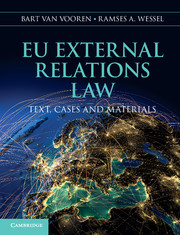Book contents
- Frontmatter
- Contents
- Table of cases
- Table of instruments and legislation
- Preface
- Acknowledgements
- List of abbreviations
- 1 The EU as a global legal actor
- 2 Instruments of EU external action
- 3 Existence of EU external competence
- 4 Nature of EU external competence
- 5 Scope and choice of EU external competence
- 6 The duty of cooperation
- 7 EU law and international law
- 8 The EU and international institutions
- 9 Common Commercial Policy
- 10 EU development policy
- 11 Common Foreign and Security Policy
- 12 Common Security and Defence Policy
- 13 The external dimension of the internal energy market
- 14 The external dimension of freedom, security and justice
- 15 The EU and its neighbours
- Index
- References
Preface
- Frontmatter
- Contents
- Table of cases
- Table of instruments and legislation
- Preface
- Acknowledgements
- List of abbreviations
- 1 The EU as a global legal actor
- 2 Instruments of EU external action
- 3 Existence of EU external competence
- 4 Nature of EU external competence
- 5 Scope and choice of EU external competence
- 6 The duty of cooperation
- 7 EU law and international law
- 8 The EU and international institutions
- 9 Common Commercial Policy
- 10 EU development policy
- 11 Common Foreign and Security Policy
- 12 Common Security and Defence Policy
- 13 The external dimension of the internal energy market
- 14 The external dimension of freedom, security and justice
- 15 The EU and its neighbours
- Index
- References
Summary
Three guiding perspectives to EU external relations law
The patchwork of EU external policies and instruments is the result of more than fifty years of European integration, and is in need of a strong sense of collective purpose in order to present a coherent response to challenges for Europe in the globalized world of the twenty-first century. Perhaps more than in any of its Member States, EU external relations law plays a crucial role in attaining that objective. In this introductory chapter, we wish to elaborate on what we consider the three ‘guiding perspectives’ crucial in studying this field of law.
First, we must naturally study the law, its functioning, interpretation and application. In substantive terms, EU external relations law is a highly complex subject matter where questions of EU law (institutional, constitutional and substantive) meet questions of international law (public, institutional, trade, etc.). This is the self-evident core of this textbook, and its starting point.
Second, while studying these rules, we must be fully aware that EU action in the world is then not neutral from the perspective of ‘political union’, e.g. the project of European integration. While at times the most effective option for the twenty-eight EU Member States would be to join forces and tackle international challenges through a single legal entity, that may raise questions relating to European integration itself: if the EU’s voice is heard on the international scene, what does this mean for the Member States’ individual voices? As a consequence, EU external relations law is often shaped by ‘grand’ debates on the future of European integration. Since international relations pertain to the core of state sovereignty, any legal rule organizing the EU as an international actor has the potential to raise questions as to the sort of political union the Member States desire. Furthermore, European integration itself is the consequence of developments in the global environment. Thus, developments in European and global politics will lead to shifting needs of the EU and its Member States in their global representation. This is often reflected through shaping the legal framework organizing any such action.
…
- Type
- Chapter
- Information
- EU External Relations LawText, Cases and Materials, pp. xxix - xxxvPublisher: Cambridge University PressPrint publication year: 2014



